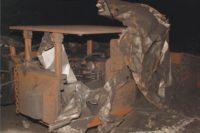MSHA report blasts Massey Energy for hiding violations, intimidating workers at Upper Big Branch (6/30)
Massey Energy not only failed to find and fix hazards at the Upper Big Branch mine, the company also intimidated miners so that they wouldn’t report unsafe conditions and hid violations from government agencies.
Those are the key findings in the report released yesterday by the Mine Safety and Health Administration (MSHA), which conducted an investigation into the tragedy last year that claimed the lives of 29 workers at the Massey-owned mine in West Virginia.
Joseph A. Main, assistant secretary of labor for mine safety and health said the investigation determined that the fatalities at the mine were “entirely preventable.”
He said methane ignited at the tail of the longwall as the longwall shearer - which had faulty water sprays - cut into sandstone in the mine roof – was the likely source of the ignition, which transitioned into a major coal dust explosion.
"The GIIP report found that 'Massey failed to properly examine the mine to find and fix hazards and violations; control the accumulation of coal dust in the mine by adequately rock dusting; maintain water spray systems on the longwall cutting shearer; submit an effective mine ventilation plan; and comply with approved plans.'"
Those are the key findings in the report released yesterday by the Mine Safety and Health Administration (MSHA), which conducted an investigation into the tragedy last year that claimed the lives of 29 workers at the Massey-owned mine in West Virginia.
Joseph A. Main, assistant secretary of labor for mine safety and health said the investigation determined that the fatalities at the mine were “entirely preventable.”
He said methane ignited at the tail of the longwall as the longwall shearer - which had faulty water sprays - cut into sandstone in the mine roof – was the likely source of the ignition, which transitioned into a major coal dust explosion.
"The GIIP report found that 'Massey failed to properly examine the mine to find and fix hazards and violations; control the accumulation of coal dust in the mine by adequately rock dusting; maintain water spray systems on the longwall cutting shearer; submit an effective mine ventilation plan; and comply with approved plans.'"
Massey hid violations from enforcement agencies
"Massey knew it was having serious compliance problems and failed to effectively fix them. However, as the GIIP report points out, Massey did more than fail to act. Massey promoted a culture that 'prized production over safety' and where 'wrongdoing became acceptable.' As such, it violated the law and disregarded basic safety practices.
"As part of this culture, the GIIP report found that Massey employed tactics to intimidate miners from speaking out about unsafe conditions. As we heard from congressional testimony of miners last spring, Massey also hid violations from government enforcement agencies, such as through advance notice of inspections, which is prohibited under the Federal Mine Safety and Health Act of 1977.”
"Your paycheck or your life"
Public Citizen, a non-profit advocacy group, said the findings highlight the need for Congress to enact strong whistleblower protections and give the government more ability to keep mine workers safe.”
“Workers at the mine were well aware that their workplace was dangerous, but they were afraid to alert authorities,” according to a statement by the group.
“Under the current, inadequate whistleblower rules, workers in dangerous mines are forced to make a choice: your paycheck or your life,” said Justin Feldman, worker health and safety advocate with Public Citizen’s Congress Watch division.
In the year since the tragedy, Congress has failed to pass legislation intended to improve safety standards or strengthen whistleblower protections for mine workers. “Instead, lawmakers are considering proposals that would undermine the regulatory process itself, hampering the ability of agencies like MSHA to set safety rules,” said Public Citizen.
“The news that Massey had resorted to falsifying safety records to deceive mine inspectors is particularly alarming,” noted Amit Narang, regulatory policy advocate with Public Citizen’s Congress Watch division. “Massey’s disregard for mine safety regulations and enforcement seems to be the direct cause of this entirely preventable disaster. We need tougher regulations and tougher enforcement to deal with the Masseys of the world, but, sadly, Congress is going in the opposite direction.”
Narang said Massey officials should face a criminal prosecution – which would deter other companies from “engaging in deadly, workers-be-damned behavior.”
Looking for a reprint of this article?
From high-res PDFs to custom plaques, order your copy today!




